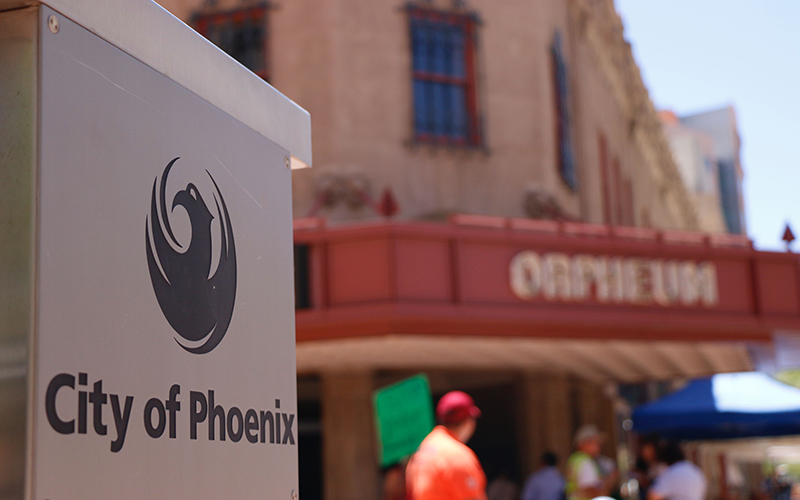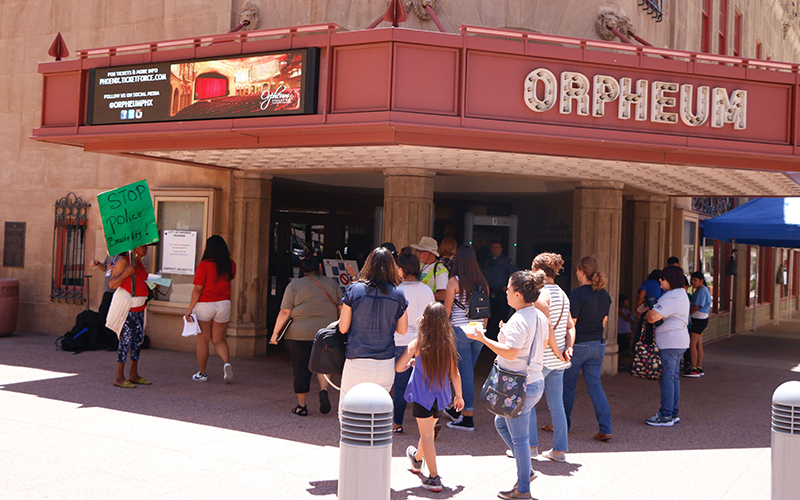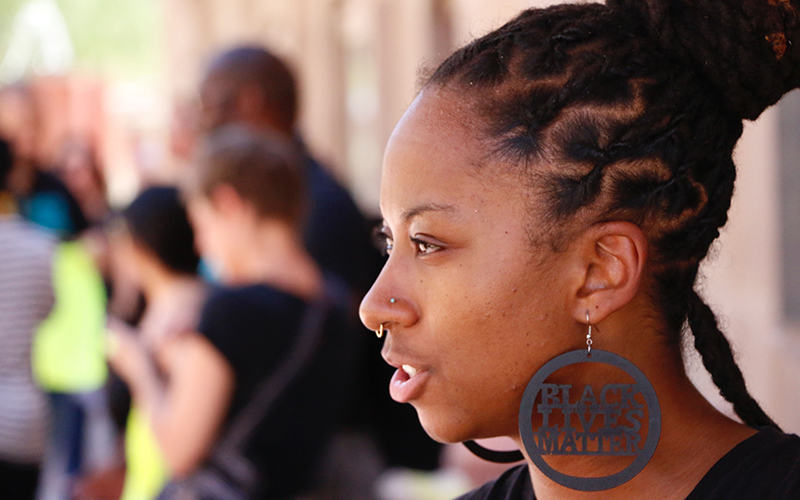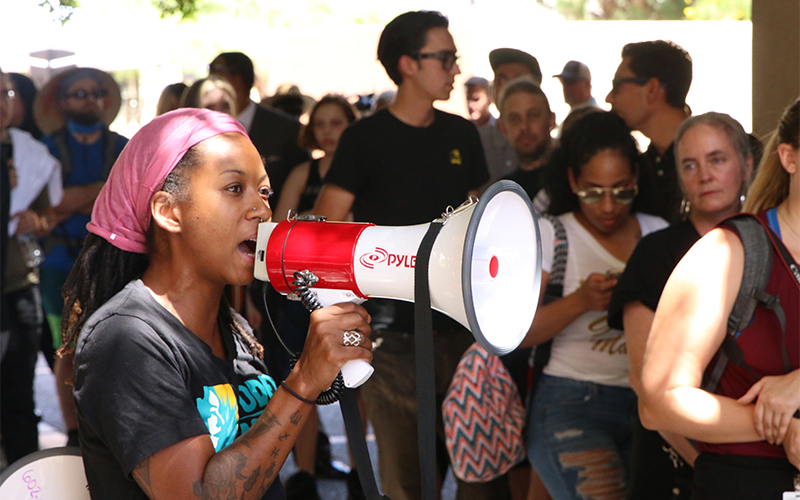
Tuesday’s special meeting of the City Council was moved to the nearby Orpheum Theatre after power outages in downtown Phoenix affected the council chambers. (Photo by Kynan Marlin/Cronkite News)

People enter the Orpheum Theatre in downtown Phoenix, where the City Council later voted 7-1 to collect and analyze data on police performance. (Photo by Kynan Marlin/Cronkite News)
PHOENIX – Phoenix will take steps to collect and analyze data on police performance, the City Council decided Tuesday. As it works to bolster public accountability, the council also is considering a survey to measure public attitudes toward police and a civilian oversight board.
A data-tracking system could work as an early-detection for police conduct, flagging bad behavior patterns before they become major problems, Police Chief Jeri Williams said.
The system also could improve training and merge different data systems to provide a “holistic” view, city officials said, adding it would look at attitudes, interactions and recommended actions.
“What can we do to get better?” Williams said.
The council voted 7-1 to explore companies and costs for the council to consider at a later meeting. But the decision came after debate on whether such a system would be effective.
Councilman Jim Waring, who questioned whether the “early-intervention system” was a solution, given the city set up a similar system in 2017, was the dissenting vote.
Councilman Carlos Garcia urged the involvement of the community in shaping such a system. Waring suggested making sure to reach out to business leaders.
The meeting was held in the wake of outrage last month over the viral video of the arrest of Dravon Ames and Iesha Harper, who were accompanied by their two young children, in May. In the video, police can be seen approaching, guns drawn, threatening to shoot the couple during a stop concerning allegations of shoplifting.
At the beginning of the meeting, Williams outlined what she called a five-point action plan: “communicate clear expectations to police employees, modernize technology and processes, assess best practices, improve training and survey” the community for feedback.
The council also discussed a survey to collect that feedback and the creation of a civilian review board.
More than 100 U.S. cities have some form of civilian review board, including about half of the country’s largest police departments, according to a city staff report.
The report cites “tipping points” instigating implementation of civilian review boards in other cities, like the shooting of a 92-year-old woman in Atlanta. While the arrest of Ames and Harper led to increased scrutiny of the Phoenix Police Department, the report was prepared for a council subcommittee in March, before the controversial stop.
The video has nonetheless led to a flurry of consternation from people on both sides of the issue.
Parris Wallace of Poder in Action said before the council meeting that the organization turned out to make sure the promises the council has made to the public are actually carried out.
“Naturally, subpoena power” should be granted to any citizen review board the council implements, she said.

Parris Wallace of Poder in Action says the organization turned out to make sure the city carries out promises the council has made. If a citizen review board is created, she says it should have subpoena powers. (Photo by Kynan Marlin/Cronkite News)
But Kathryn Kobor came out to support the police. Kobor believes in “justice and fairness for everybody,” but said there are already citizen-related review groups for police and another is unnecessary.
Kobor said the police have been “kicked into a corner” and worried a civilian review board would be “composed of leftist liberals” hostile to the police force.
Two weeks ago, police-reform activists descended on a City Council budget meeting demanding that measures holding officers accountable be adopted before any budget was passed. They also sought a faster rollout of body cameras, the firing of the officers involved in the Ames stop and a community review board.
The budget passed 8-2 despite these complaints, with council members agreeing to further explore strategies to improve community-police relations, including a civilian review board. Garcia expressed support for a review board with subpoena power and disciplinary authority.
The mood changed last week as pro-police activists turned out at City Hall to voice their support of the department. Where Councilman Sal DiCiccio’s praise for officers was met with boos the week before, this time it was welcomed with cheers and applause.
Tuesday’s special meeting of the council looked at various strategies employed in other cities that implement civilian review boards. These were characterized using standards from the National Association of Civilian Oversight of Law Enforcement, a nonprofit organization focused on civilian oversight of the police.
The report shows three main options: review-focused boards, auditor/monitor boards and investigations boards.
Review-focused boards involve the reviewing body relying on a police department’s initial review and formulating an independent conclusion. These cheaper, less-staffed, boards can agree, disagree and recommend more training to reduce the recurrence of issues. This is the strategy utilized in San Antonio and Charlotte.
The auditor/monitor model takes a look at data trends and spikes in issues within the force. The board will analyze these data and make recommendations to the police chief, city manager, review board or city council. This is the model employed by Los Angeles and New York City.
An investigations board, as Garcia called for earlier this month, is a civilian review board with subpoena power and disciplinary authority that conducts its own investigation into police misconduct. The report says this costly, staff-intensive model allows residents to complain directly to a civilian review board, circumventing an Internal Affairs Office. Boise and Pittsburgh employ this model.
Although a community review board would be a new step for the city, Phoenix has implemented citizens advisory boards to the police since the mid-1980s, the report says. Such groups allow representatives to maintain communication with police officials to relay concerns on behalf of their communities. Since the advisory boards began, 12 advisory groups have formed representing varying racial, ethnic, LGBTQ, disabilities and religious groups.
Follow us on Twitter.
